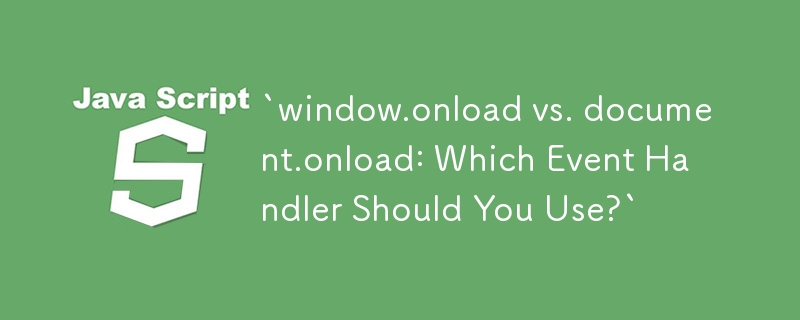Home >Web Front-end >JS Tutorial >`window.onload vs. document.onload: Which Event Handler Should You Use?`
`window.onload vs. document.onload: Which Event Handler Should You Use?`
- Patricia ArquetteOriginal
- 2024-12-21 12:55:09404browse

Comparing window.onload and document.onload in Web Development
When working with web development, understanding the behavior and support of different event handlers is crucial. This article delves into the differences between two commonly used event handlers: window.onload and document.onload.
Timing of Execution
- window.onload: Traditionally, this event fires when the entire webpage loads, including all external content (images, CSS, scripts). However, in modern browsers, it may also trigger when the DOM is ready.
- document.onload: This event is explicitly triggered when the DOM has finished loading, before any external resources.
Browser Support
- window.onload: This event has widespread compatibility across browsers. It is generally considered the more widely supported event handler.
- document.onload: While document.onload is still supported, its usage has been superseded by window.onload in many browsers.
Practical Considerations
In most cases, window.onload is the preferred option, as it ensures that all page content has loaded before executing the associated code. document.onload, on the other hand, may be more suitable for situations where the DOM needs to be manipulated immediately, even if external content is still loading.
Alternative Solutions
Due to potential browser compatibility issues, some developers opt for JavaScript libraries like jQuery to handle event triggering. jQuery's $(document).ready() function simplifies the process of checking for DOM readiness.
Historical Note
Traditionally, body.onload was used as an event handler for page load. However, it has since been deprecated in favor of window.onload for improved code organization and separation of concerns.
The above is the detailed content of `window.onload vs. document.onload: Which Event Handler Should You Use?`. For more information, please follow other related articles on the PHP Chinese website!
Related articles
See more- An in-depth analysis of the Bootstrap list group component
- Detailed explanation of JavaScript function currying
- Complete example of JS password generation and strength detection (with demo source code download)
- Angularjs integrates WeChat UI (weui)
- How to quickly switch between Traditional Chinese and Simplified Chinese with JavaScript and the trick for websites to support switching between Simplified and Traditional Chinese_javascript skills

